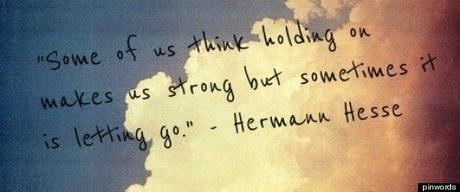
Once, in the early days of my pastoring experiences, I visited with a couple who were not too far from their 50th wedding anniversary who were heartbroken as they watched one of their children going through a divorce. I remember to this day the words of that father, as he told me, “I think it would be easier to go through a divorce myself than to watch my son going through one.”
It was a sentiment I have heard many times since, and I was reminded of it just the other day as I visited with a woman who is a grandmother of children whose parents recently divorced. I had just met this woman when she introduced herself, telling me she had bought my book at the bookstore and passed it down to her child, and was telling me how much it had been appreciated. It was nice to hear, and it made me think about some things worth blogging about, I believe.
Today I want to discuss some of the issues between such a parent and their adult child. In the next blog, I will focus on the issues of grandparenting the children during the divorce. Before I do, I would suggest that you not allow yourself to get caught up in some kind of self-deprecation, questioning whether you have failed as a parent and thus caused your child’s divorce. Every parent makes mistakes, and sometimes really big mistakes. We have to own that fact. However, the adult child makes their own choices, and when there is a divorce, the child’s spouse also makes choices, and the responsibility for those choices rests with them, not with you. If you feel you need to apologize or make amends, then by all means, do so. But do not take on responsibility for somebody else’s life and their choices. We each have enough responsibility for our own!
 Sometimes the parent watches from the sidelines as their adult child makes poor or maybe vindictive decisions, not caring to hear the wise counsel of a concerned parent. In other cases, they observe their adult child being victimized in the divorce process by a dishonest or abusive spouse. There have been times I have known of parents who, in the process of divorce, discovered for the first time how much their adult child has suffered in an abusive marriage. Brokenhearted for their child, the parent is often powerless to make a difference they might long to make.
Sometimes the parent watches from the sidelines as their adult child makes poor or maybe vindictive decisions, not caring to hear the wise counsel of a concerned parent. In other cases, they observe their adult child being victimized in the divorce process by a dishonest or abusive spouse. There have been times I have known of parents who, in the process of divorce, discovered for the first time how much their adult child has suffered in an abusive marriage. Brokenhearted for their child, the parent is often powerless to make a difference they might long to make.So, what to do?
A few thoughts for the parents, and perhaps later for the divorcing child might be in order.
First, if you are the parent, realize you are never truly powerless. It may seem trite to some, but the truth is that there is more power in prayer than the mightiest army on earth. Pray for your child…even if you don’t know all the details of the marriage or the divorce, God does know them, and your prayer support brings the power of God to bear upon a difficult situation.Secondly, while it isn’t healthy to be there as a rescuer, it can be extremely helpful to be available as a refuge. Sometimes the child may need to get away for temporary shelter in your home, for an outing to dinner or a museum, or maybe even need you as an occasionalbabysitter or a bit of financial aid. These are tangible things you can offer, but they are also things that you must be careful to not allow to become overly enmeshing or enabling (and sometimes the heartstrings make those boundaries difficult to discern).While you may be a good listener to the struggles of your adult child, it isn’t helpful for you to join an attack on the ex, or to try to solve all their problems. A sympathetic ear can be very encouraging, but you may need to be careful, if you are “dumped on” too much, it may create too much emotional drain on YOU, making you no longer able to parent and grandparent effectively. It may be wise to encourage them to develop friendships where they can also seek support, or help pay for a counselor who can provide useful support. While it may be tempting, it usually isn’t helpful to be judgmental about poor choices made, although there is nothing wrong with occasionallyexpressing concern over inappropriate actions or choices.
I have known of times parents have actively assisted their adult child during a divorce, sometimes in positive ways, sometimes in very questionable ways. For example, I have known of parents who have assisted their child in secreting away money that shouldhave been reported as assets to the court, believing that they are helping secure their child’s financial future. While the intent is noble, it causes me to wonder if financial security is being sought at the expense of personal integrity and character, a choice that could have significant consequences later on. I have seen parents who have washed their hands of the whole thing in various ways, with statements such as “you have made your bed, now lay in it” might suggest (not that I am opposed to natural consequences or the importance of personal commitment and responsibility). Others have watched their adult child do abusive things toward their ex, and simply said, “oh well, he has always been a difficult person,” when challenging their child could have been an opportunity to make a difference in the kind of person they have raised.
I have never been the parent of a divorcing child, so I can only imagine how hard it must be. Like most parents, I have had to accept choices of children or step children that I may not consider the best choices on their part, and have experienced the various heartbreaks that always comes with parenting.
But I do know this: the unconditional and healthy love of a parent can make all the difference in the world. Hang in there, they still need you, whether they are divorcing at the tender age of 20, or in their third divorce at the age of 55. They remain your child, and though you cannot (and should not)solve all their problems, you can love them, pray for them, and care for them as you continue into the next stage of parenting them. And as you do, I encourage you to allow God to parent YOU, healing the heartbreak you experience along the way.
TL:dr It is a fine and heartbreaking balance between loving parenting and overinvolved enabling as one cares for an adult child experiencing divorce.
